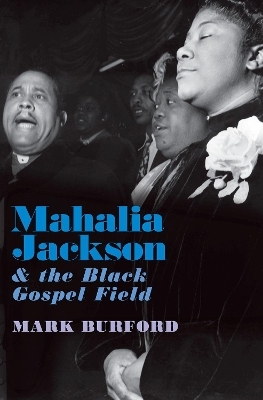
Mahalia Jackson and the Black Gospel Field
Oxford University Press Inc (Verlag)
978-0-19-009552-9 (ISBN)
Nearly a half century after her death in 1972, Mahalia Jackson remains the most esteemed figure in black gospel music history. Born in the backstreets of New Orleans in 1911, Jackson during the Great Depression joined the Great Migration to Chicago, where she became an highly regarded church singer and, by the mid-fifties, a coveted recording artist for Apollo and Columbia Records, lauded as the "World's Greatest Gospel Singer."
This "Louisiana Cinderella" narrative of Jackson's career during the decade following World War II carried important meanings for African Americans, though it remains a story half told. Jackson was gospel's first multi-mediated artist, with a nationally broadcast radio program, a Chicago-based television show, and early recordings that introduced straight-out-of-the-church black gospel to American and European audiences while also tapping the vogue for religious pop in the early Cold War. In some ways, Jackson's successes made her an exceptional case, though she is perhaps best understood as part of broader developments in the black gospel field. Built upon foundations laid by pioneering Chicago organizers in the 1930s, black gospel singing, with Jackson as its most visible representative, began to circulate in novel ways as a form of popular culture in the 1940s and 1950s, its practitioners accruing prestige not only through devout integrity but also from their charismatic artistry, public recognition, and pop-cultural cachet. These years also saw shifting strategies in the black freedom struggle that gave new cultural-political significance to African American vernacular culture.
The first book on Jackson in 25 years, Mahalia Jackson and the Black Gospel Field draws on a trove of previously unexamined archival sources that illuminate Jackson's childhood in New Orleans and her negotiation of parallel careers as a singing Baptist evangelist and a mass media entertainer, documenting the unfolding material and symbolic influence of Jackson and black gospel music in postwar American society.
Mark Burford is Associate Professor of Music at Reed College in Portland, Oregon, where he is also chair of the American Studies program. His research and teaching focuses on twentieth-century popular music in the United States, with particular focus on African American music after World War II, and late eighteenth- and nineteenth-century Austro-German concert music.
Acknowledgements
Preface
1 Introduction: "Miss Jackson and her art (Gospel Singing)"
2 Family Affairs, Part 1: The Clarks of Louisiana
3 Family Affairs, Part 2: Black Baptists and Chicago Gospel
4 Gospel Singing as Black Popular Culture
5 Apollo Records and the Birth of Religious Pop
6 Mahalia Jackson's Apollo Recordings
7 Hearing Voices
8 Gospel According to Bill Russell
9 "Singing comes as natural as breathing": The Mahalia Jackson Show
10 "The World's Greatest Gospel Singer"
11 "I'm just Mahaly to you all": The Meanings of Fame
Conclusion
Notes
Bibliography
Index
| Erscheinungsdatum | 19.11.2019 |
|---|---|
| Zusatzinfo | 46 illus. |
| Verlagsort | New York |
| Sprache | englisch |
| Maße | 231 x 155 mm |
| Gewicht | 726 g |
| Themenwelt | Kunst / Musik / Theater ► Musik ► Klassik / Oper / Musical |
| ISBN-10 | 0-19-009552-0 / 0190095520 |
| ISBN-13 | 978-0-19-009552-9 / 9780190095529 |
| Zustand | Neuware |
| Haben Sie eine Frage zum Produkt? |
aus dem Bereich


